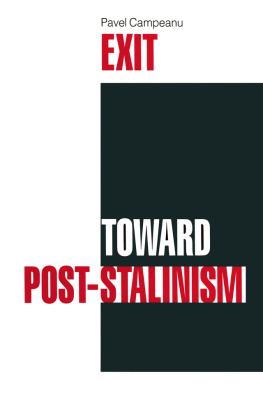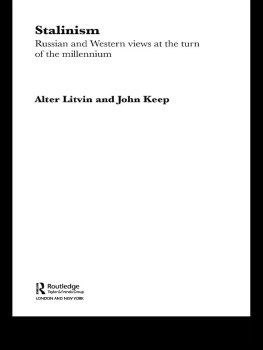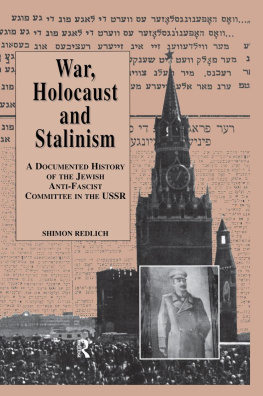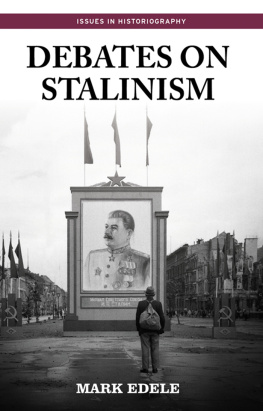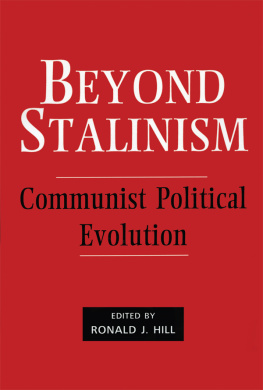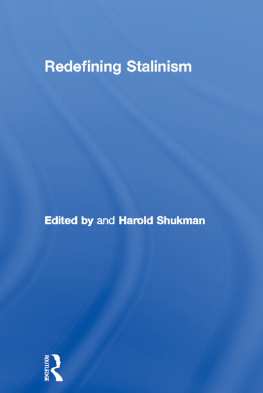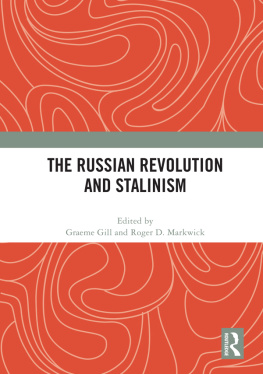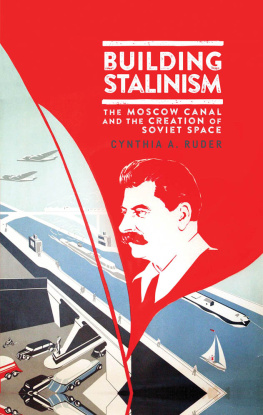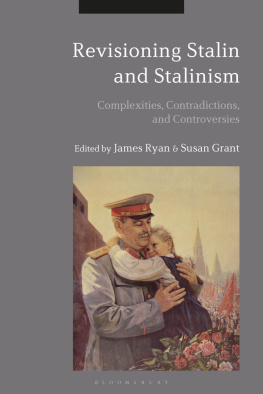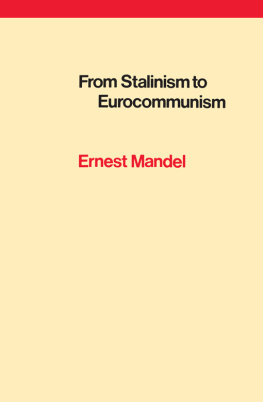EXIT
Pavel Campeanu
Exit Toward Post-Stalinism
Translated by Michel Vale
For Stefanake
First published 1990 by M.E. Sharpe
Published 2015 by Routledge
2 Park Square, Milton Park, Abingdon, Oxon OX14 4RN
711 Third Avenue, New York, NY 10017, USA
Routledge is an imprint of the Taylor & Francis Group, an informa business
Copyright 1990 Taylor & Francis. All rights reserved.
No part of this book may be reprinted or reproduced or utilised in any form or by any electronic, mechanical, or other means, now known or hereafter invented, including photocopying and recording, or in any information storage or retrieval system, without permission in writing from the publishers.
Notices
No responsibility is assumed by the publisher for any injury and/or damage to persons or property as a matter of products liability, negligence or otherwise, or from any use of operation of any methods, products, instructions or ide as contained in the material herein.
Practitioners and researchers must always rely on their own experience and knowledge in evaluating and using any information, methods, compounds, or experiments described herein. In using such information or methods they should be mindful of their own safety and the safety of others, including parties for whom they have a professional responsibility.
Product or corporate names may be trademarks or registered trademarks, and are used only for identification and explanation without intent to infringe.
Library of Congress Cataloging-in-Publication Data
Campeanu, Pavel.
Exit: toward post-Stalinism / by Pavel Campeanu.
p. cm.
ISBN 0-87332-587-7
1. CommunismSoviet Union. 2. Soviet UnionPolitics and government1985
.I. Title.
HX313.5.C36 1990
947.085'4dc20
90-8853
CIP
ISBN 13: 9780873325875 (hbk)
Contents
PAVEL CAMPEANU was born in Bucharest, Romania, in 1920. He joined the Communist Youth League in 1935 and the Romanian Communist Party in 1940. From 1941 until 1944 he was imprisoned for antifascist activity.
In 1960 Campeanu received a Ph.D. in sociology from the Stefan Gheorghiu Academy and from that year until 1980 was head of the Opinion-Polling Department of Romanian television. He was appointed Professor of Social Sciences at the Bucharest Polytechnic Institute in 1950, then joined the Institute of Social Sciences at Stefan Gheorghiu Academy in 1956 and the journalism faculty in 1976. He has served as a communications expert with UNESCO, is a member of several international mass-communications associations, and has lectured widely in North America and Eastern and Western Europe. He was awarded the Prize of the Romanian Academy in 1964 and again in 1977.
Campeanu is the author of numerous articles published in Romania and elsewhere. His essays "Life and Death in Romania" (published under a pseudonym) and "The Revolt of the Romanians" appeared in The New York Review of Books issues of October 23, 1986, and February 1, 1990, respectively. He is the author of several books, among which is a triology on audiences: People and the Theatre, People and TV, and (in collaboration with Stefana Steriade) People and the Movies. His comprehensive examination of Stalinism, first outlined in The Syncretic Society (published under the pseudonym Felipe Casals, M. E. Sharpe, 1980), begins in The Origins of Stalinism (M. E. Sharpe, 1986), continues in The Genesis of the Stalinist Social Order (M. E. Sharpe, 1988), and concludes with the present volume. Campeanu is now completing a study of the queue.
Exit marks the end of a work begun more than twenty years ago, in Bucharest, in reaction to the shock produced by the invasion of Czechoslovakia. This labor has now drawn to a conclusion in the wake of another shock, one that is both welcome and disquieting, produced by the attempt to reform Stalinism, which now seems to have entered a new historical phase.
Three cardinal changes have occurred over the course of this long trajectory: one in a biographical, the other two in a historical key. The first might also be said to have been psychological, as this project, combining observation, reflection, and militancy, enabled me to transform a profound political frustration into an engaging theoretical endeavor. The second change concerned the immediate environment, as the Romanian authorities interfered with this work in an increasingly direct fashion. Their pressure had two culminating moments. The first was in 1982, in Bucharest, when Stefana Steriade and my daughter, Vera Campeanu, were subjected to house searches and prolonged interrogations, both without results. The second was in 1988, when the police, after having confiscated a copy of the manuscript of Exit at the Otopeni International Airport, interrogated me and withdrew my passport, but in the end allowed me to undertake my trip to the United States (which had already been approved) on the condition that I would publish nothing and would confine my activities to medical treatment following an operation for cancer. This incident signified a growing uncertainty surrounding the conditions under which this book finally saw the light of day.
Finally, the third crucial change was in the international environment. The historical movement proceeding toward the abolishment of the Stalinist organization of certain societies seemed to have entered a new phasea salubrious change that impelled me to revise my initial project. All in all, my project, and especially the present volume, was inspired by the desire to contribute to an understanding and theoretical grasp of this historical turning point.
Laboring on these themes has been a moving experience, in theoretical, political, and human terms. The persons who have made this work possible do not necessarily share its conclusions. Their number is too vast to mention them all, or even most of them. The list of names, or rather unnamed names, begins in Romania, with my young comrades who fell in the battle for a society of which Stalinism represents the most brutal negation. Their life was snuffed out by fascism, their memory mystified by Stalinism. In death they were forced to legitimate a power for which, had they lived, they could only have felt the deepest shame. The meaning of their deaths was turned against the purpose of their lives. Assassinated twice over, the thanklessness of their deaths was one of the most powerful incentives for this work.
Next come those who in the most trying moments assumed the risk of offering me more than their sympathy, namely, their active solidarity. And then come those who in the course of many discussions on the wing shared their own reflections and insights with me.
From its very beginning, down to the present, this long journey in time, in space, and in the unknown bore the mark in every respect of the beatific presence of Stefana. Her political, intellectual, and emotional engagement played a decisive role at each juncture, beginning with the initial decision to undertake the work, continuing through the attacks it occasioned and of which she at one time became the direct target, and finally to its realization, which her insistence improved substantially.
The pursuit of this project brought more worries than joy to my daughter, Vera Campeanu, who defended it in dramatic circumstances with a courage, discretion, and effectiveness each more remarkable than the other. And finally, in diverse ways both direct and indirect, my son, Gheorghe Campeanu, contributed generously to its successful completion.

